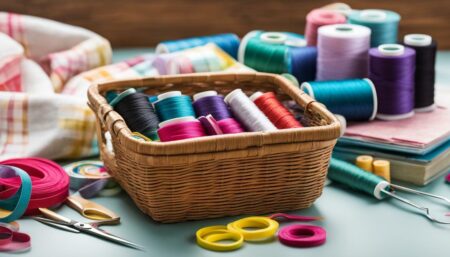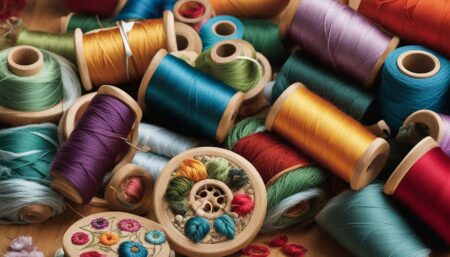Here’s a sample introduction for Section 1:
In recent years, the fashion industry has taken significant steps towards sustainability, recognizing the negative impact of fast fashion on the environment and society. Ethical sewing practices are crucial to this movement, promoting fair trade techniques, eco-friendly materials, and responsible manufacturing processes.
Embracing ethical sewing practices is not only a way to contribute to a greener future but also to promote the production of ethical fashion and reduce waste. Consumers and fashion brands alike can make a difference by adopting conscious sewing techniques and embracing a more sustainable approach to fashion.
- Ethical sewing practices are essential for sustainable fashion.
- These practices promote fair trade, eco-friendly materials, and responsible manufacturing.
- Adopting ethical sewing practices can reduce waste and contribute to a greener future.
- Consumers and fashion brands can make a difference through conscious sewing techniques.
- The fashion industry is evolving towards greater sustainability, and ethical sewing practices play an essential role in this movement.
Understanding Ethical Sewing Practices
When we talk about ethical sewing practices, we are referring to responsible sewing techniques that prioritize sustainability and fairness. This includes the use of eco-friendly materials, fair trade techniques, and responsible manufacturing processes that consider both social and environmental impact.
Ethical sewing techniques involve conscious sewing practices that aim to minimize waste, reduce energy consumption, and promote sustainable garment production. These techniques include zero-waste cutting, upcycling, and using natural dyes instead of harmful chemicals.
Responsible sewing also means taking a critical look at the entire supply chain, from textile production to garment manufacturing. This ensures that everyone involved in the production process is treated fairly and that the environment is not being harmed in the process.
Overall, ethical sewing practices are crucial for ensuring that the fashion industry becomes more sustainable and responsible. By embracing these practices, we can move towards a future where fashion is not only beautiful but also ethical and environmentally conscious.
“The fashion industry is the second-largest polluter in the world, and it’s time for us to take responsibility and embrace ethical sewing practices.”
The Impact of Ethical Sewing on the Fashion Industry
Ethical sewing practices have a significant impact on the fashion industry, promoting sustainability and responsible manufacturing. The adoption of ethical sewing practices leads to the production of ethical fashion, which focuses on the environmental and social aspects of garment manufacturing.
By embracing ethical sewing practices, fashion brands can ensure that their products are made in a way that protects the planet and the people who make them. Consumers are increasingly demanding ethical fashion, and forward-thinking fashion brands are responding by adopting ethical sewing practices.
The concept of ethical fashion is closely linked to the idea of sustainable fashion, which seeks to minimize the fashion industry’s negative impact on the environment and society. Sustainable fashion promotes the use of eco-friendly materials and responsible manufacturing processes, which go hand in hand with ethical sewing practices.
As ethical sewing practices become more widely adopted, the fashion industry is becoming more sustainable. Fashion brands are recognizing the importance of ethical fashion and are incorporating it into their brand values and strategies. The emergence of sustainable fashion has led to a shift in the industry, with consumers becoming more conscious about the impact of their fashion choices.
The Role of Consumers in Promoting Ethical Fashion
Consumers play an important role in promoting ethical fashion. By choosing to buy from fashion brands that prioritize ethical sewing practices, consumers can support the positive change in the industry. A growing number of consumers are looking for sustainable and ethical fashion options, and fashion brands are responding by providing more of these options.
Consumers can also advocate for ethical fashion and demand that fashion brands produce their garments in a way that aligns with ethical principles. By creating demand for ethical fashion, consumers can promote the adoption of ethical sewing practices in the fashion industry, driving the industry towards greater sustainability.
The Importance of Ethical Textile Production
At the heart of ethical sewing practices lies the need for responsible textile production. It involves considering the social and environmental impact of textiles, from the sourcing of raw materials to the end product. Conscious sewing techniques are essential for reducing the carbon footprint of the fashion industry.
The use of eco-friendly textiles is a critical step towards ethical sewing. Eco-friendly textiles are made using non-toxic, sustainable materials that do not harm the environment. They are also animal-friendly and promote the humane treatment of animals.
Furthermore, ethical textile production involves fair wages and safe working conditions for workers involved in the production process. Responsible manufacturing of textiles promotes social justice, reduced exploitation, and equitable distribution of resources. Consistent adoption of ethical textile production practices will reduce harm to the environment and promote sustainability.
As consumers, we can support ethical textiles by purchasing from sustainable brands that prioritize environmental and social responsibility. Many brands have adopted eco-friendly and sustainable practices, including the use of organic cotton and recycled materials. By supporting such brands, we are indirectly promoting ethical textile production and contributing to a sustainable future.
Here’s the HTML text for section 5:
Fair Trade Sewing for a Better Future
Embracing ethical sewing practices involves supporting fair-trade garment manufacturing. By purchasing from companies that follow these principles, consumers can contribute to sustainable fashion and protect workers’ rights. Fair trade sewing aims to create opportunities for marginalized communities, promote gender equality, and prevent child labor.
Choosing products with a fair trade certification ensures that workers receive fair wages, safe working conditions, and access to education and healthcare. Additionally, fair trade sewing promotes eco-friendly and sustainable manufacturing practices, minimizing the impact on the environment.
As consumers, we can make a significant impact by prioritizing ethical sewing practices and supporting brands that align with our values. By promoting fair trade sewing and sustainable fashion, we can create a better future for both people and the planet.
Here’s the HTML text for section 6 of the article:
Eco-Friendly Sewing Materials and Techniques
When it comes to ethical sewing practices, using eco-friendly materials and techniques is crucial for promoting sustainability in the fashion industry. Instead of relying on traditional sewing materials that may harm the environment, consider exploring sustainable alternatives.
One option is to choose organic cotton, which is grown without the use of harmful pesticides and chemicals. Another sustainable option is to use recycled fabrics, such as polyester made from recycled plastic bottles. Furthermore, consider using natural dyes made from plant-based materials instead of synthetic dyes that contribute to water pollution.
Aside from materials, incorporating eco-friendly techniques can also significantly reduce the environmental impact of sewing. For instance, using a low-impact sewing machine and opting for hand-sewing when possible can decrease energy consumption and minimize waste. Additionally, try to use scraps and leftover materials to create new designs and reduce textile waste in the production process.
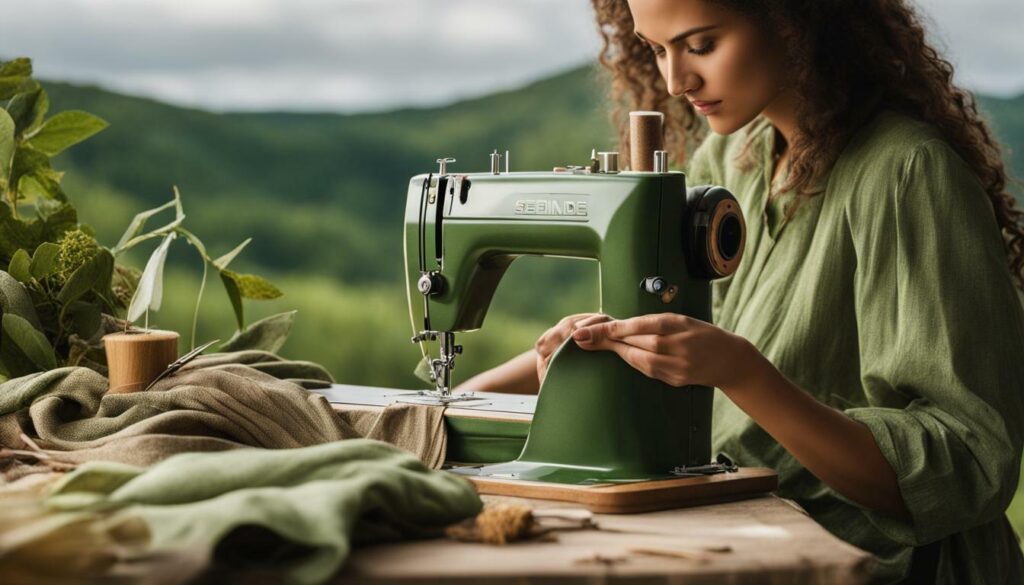
Applying these eco-friendly sewing techniques and materials can contribute to a greener future while still creating beautiful and sustainable fashion pieces.
Here’s an HTML text for section 7:
Implementing Ethical Sewing Practices in Garment Manufacturing
Implementing ethical sewing practices in garment manufacturing is crucial for ensuring sustainable fashion. Ethical garment manufacturing involves the use of responsible sewing techniques, fair wages, and safe working conditions for workers in the fashion industry.
One of the most important aspects of ethical garment manufacturing is responsible sewing techniques. This involves the use of eco-friendly materials and low-impact methods to reduce the environmental footprint of garment production. It also means ensuring that the manufacturing process does not involve harmful chemicals or processes that can cause harm to the workers and the environment.
In addition to responsible sewing, fair wages are also essential for ethical garment manufacturing. Workers involved in the production of garments should receive fair compensation for their work. This will help to prevent exploitation and ensure that workers can support themselves and their families.
Another crucial aspect of ethical garment manufacturing is safety. Workers should be provided with safe working conditions, including proper ventilation, lighting, and protection from harmful materials. This will help to prevent accidents and injuries that can occur during the manufacturing process.
Implementing ethical sewing practices in garment manufacturing is a process that requires dedication and persistence. It involves making changes to the way garments are produced and marketed. However, it is a necessary step towards a more sustainable fashion industry that values the well-being of workers and the planet.
As consumers, we can also play a role in promoting ethical sewing practices in garment manufacturing. By supporting ethical fashion brands and advocating for ethical garment manufacturing practices, we can contribute to a more sustainable future.

Overall, it is important for the fashion industry to embrace ethical sewing practices in garment manufacturing. This will contribute to a more sustainable fashion industry that prioritizes the well-being of workers and the planet.
Steps Towards Ethical Sewing at Home
Embracing ethical sewing practices doesn’t have to be limited to professional garment manufacturing. Even beginners can contribute to sustainable fashion by incorporating conscious sewing techniques into their personal sewing projects.
To get started, consider these steps:
- Source sustainable materials, such as organic cotton or recycled fabrics, that have a lower environmental impact than conventional materials.
- Choose ethical patterns that prioritize sustainable practices and materials.
- Incorporate conscious sewing techniques into your sewing projects, such as zero-waste sewing, scrap-busting, and natural dyeing.
- Support ethical garment manufacturing by purchasing from fair trade brands that prioritize sustainable fashion.
By implementing these steps, you can contribute to a greener future and promote sustainable fashion in your own way.
Take a look at the image below to get a better idea of how you can incorporate ethical sewing practices at home:

Promoting Ethical Sewing in Fashion Brands
The fashion industry has the power to influence and shape the way we consume clothes, and with this power comes great responsibility. Fashion brands can contribute significantly to the promotion of ethical sewing practices by incorporating them into their values and strategies. By doing so, they can take a step towards building a sustainable fashion industry that is conscious of its social and environmental impact.
Fashion brands can promote ethical sewing by partnering with suppliers and manufacturers that uphold responsible sewing practices. This includes ensuring fair wages and safe working conditions for workers in the supply chain, as well as using eco-friendly materials and processes.
Another way to promote ethical sewing is by incorporating it into brand messaging and marketing. Brands can highlight their commitment to ethical fashion and educate their consumers on the importance of making conscious fashion choices. This can include promoting sustainable materials, responsible manufacturing processes, and ethical garment production.
Ultimately, the promotion of ethical sewing in fashion brands reflects a growing trend towards sustainability and social responsibility. Consumers are becoming more conscious of their fashion choices and are actively seeking out brands that align with their values. By embracing ethical sewing practices, fashion brands can not only contribute to a healthier planet but also build stronger relationships with their customers.
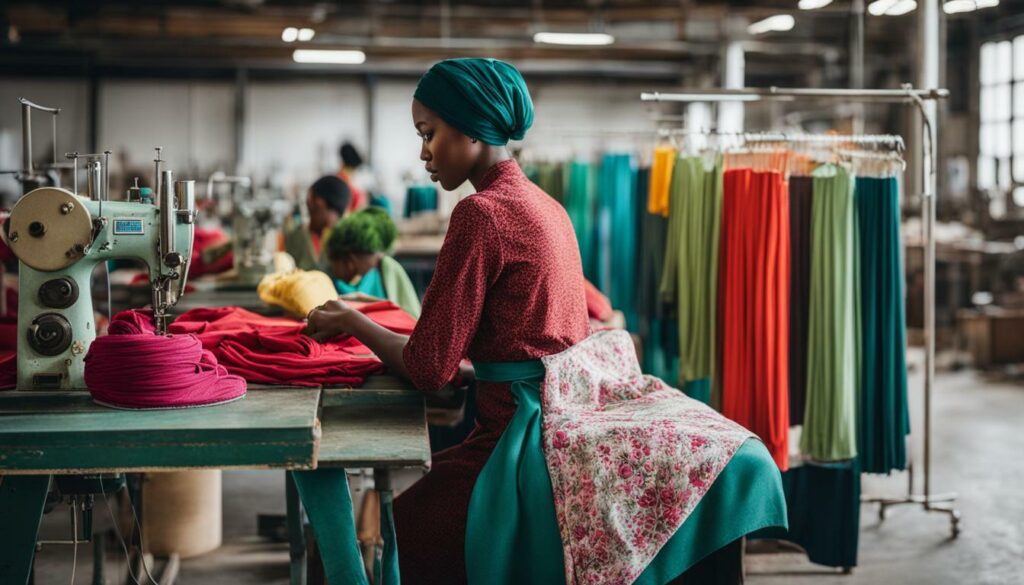
The Challenges of Embracing Ethical Sewing Practices
While ethical sewing practices are crucial for a sustainable fashion industry, there are several challenges that companies face in implementing these practices. One such challenge is the cost involved in sourcing sustainable materials and implementing eco-friendly manufacturing processes. The cost of producing ethical fashion is often higher than that of conventional fashion, and this can pose a challenge for companies trying to balance ethical values with financial goals.
Another challenge is the lack of awareness among consumers regarding ethical sewing practices. Many people are not aware of the positive impact that their purchasing decisions can have on the environment and society. As a result, companies may struggle to find a market for their ethical products.
Overcoming these challenges requires persistence and commitment. Companies must be willing to invest in sustainable practices, even if it means higher production costs. They must also educate consumers about ethical sewing practices and the benefits of supporting sustainable fashion.
Ultimately, the fashion industry has a responsibility to prioritize sustainability over profit. By embracing ethical sewing practices, we can create a future where fashion is not only beautiful and trendy but also ethical and environmentally responsible.
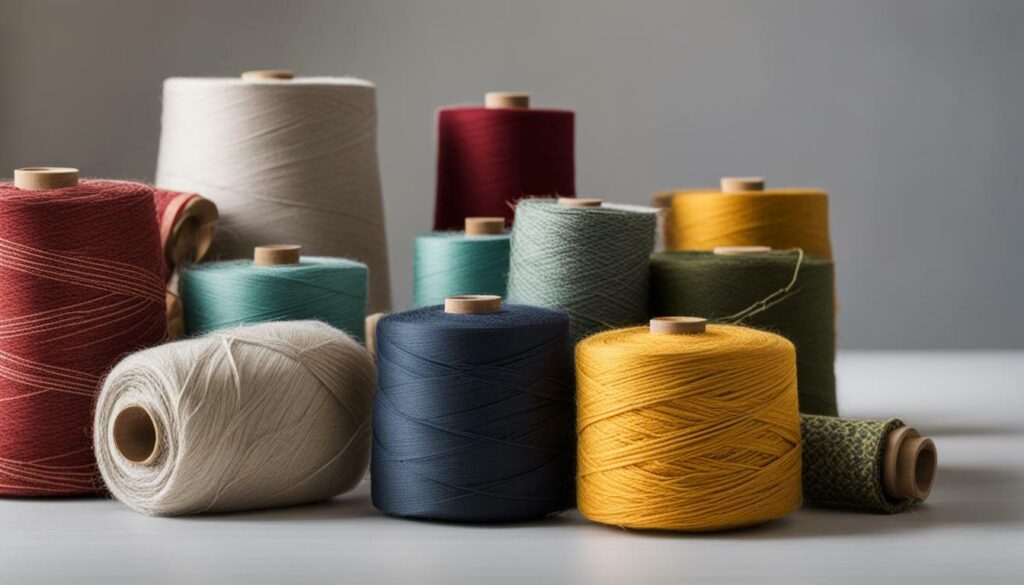
Here’s the HTML text for section 11 of the article:
The Future of Ethical Sewing Practices
The fashion industry is rapidly evolving, and ethical sewing practices are becoming increasingly important. As consumers demand greater transparency and sustainability from fashion brands, we can expect more emphasis on ethical production practices in the future.
Emerging technologies such as 3D printing and automation have the potential to revolutionize the way garments are produced, making it easier to implement ethical sewing practices on a large scale. We may also see increased collaboration between fashion brands and textile suppliers to develop new, sustainable materials.
As the sustainable fashion movement gains momentum, we can expect to see a shift towards more collaborative and transparent practices throughout the entire fashion supply chain. Consumers will continue to play a crucial role in driving this change by demanding greater brand accountability and seeking sustainable fashion options.
The future of ethical sewing practices is bright, and we can all play a part in shaping it by making conscious fashion choices and supporting brands that prioritize sustainability. Let’s continue to work towards a more ethical and sustainable fashion industry for a better future.

Conclusion
In conclusion, ethical sewing practices are crucial to the sustainable fashion movement. By embracing fair trade techniques, using eco-friendly materials and responsible manufacturing processes, and adopting conscious sewing practices, we can create a better future for our planet and the people who live on it. Fashion brands and individuals must prioritize ethical sewing practices and work together to promote sustainable fashion choices.
As we move towards a more sustainable future, we must acknowledge the challenges we may face in adopting these practices. However, by persisting in our efforts and prioritizing sustainability, we can overcome these obstacles and pave the way for a more ethical and environmentally conscious fashion industry.
Join the sustainable fashion movement by embracing ethical sewing practices and making conscious fashion choices. Together, we can create a brighter future for ourselves and the planet.
FAQ
What are ethical sewing practices?
Ethical sewing practices refer to fair trade techniques, eco-friendly materials, and responsible manufacturing processes in the fashion industry. They promote sustainability and consider both environmental and social aspects of garment production.
Why are ethical sewing practices important for sustainable fashion?
Ethical sewing practices are essential for sustainable fashion because they contribute to the industry’s overall sustainability. By adopting these practices, fashion brands can produce ethical fashion, reduce their environmental footprint, and ensure fair treatment of workers.
How do ethical sewing practices impact the fashion industry?
Ethical sewing practices have a positive impact on the fashion industry. They promote the production of ethical fashion, encourage responsible manufacturing, and contribute to a greener future. Embracing these practices can lead to a more sustainable and conscious fashion industry.
What is the significance of ethical textile production in ethical sewing?
Ethical textile production is crucial in ethical sewing practices. It involves considering the environmental and social aspects of textile production, such as using sustainable materials, minimizing waste, and ensuring fair working conditions for textile workers.
What is fair trade sewing, and why is it important?
Fairtrade sewing refers to garment manufacturing processes that prioritize fair wages, safe working conditions, and ethical treatment of workers. Supporting fair trade sewing is important as it promotes social justice, ensures fair compensation, and contributes to sustainable fashion.
What are eco-friendly sewing materials and techniques?
Eco-friendly sewing materials and techniques are sustainable alternatives to traditional sewing materials and methods. They include using organic fabrics, recycled materials, and low-impact dyes. Adopting these practices can reduce environmental harm and promote sustainability in sewing projects.
How can ethical sewing practices be implemented in garment manufacturing?
Ethical sewing practices can be implemented in garment manufacturing by adopting responsible sewing techniques, treating workers fairly, and ensuring safe working conditions. It involves considering the social and environmental impacts of production and prioritizing sustainability.
How can individuals embrace ethical sewing practices at home?
Individuals can embrace ethical sewing practices at home by sourcing sustainable materials, choosing ethical patterns, and incorporating conscious sewing techniques. This includes considering the environmental and social impacts of sewing projects and making responsible choices.
How can fashion brands promote ethical sewing practices?
Fashion brands can promote ethical sewing practices by incorporating ethical fashion principles into their brand values and strategies. This involves prioritizing sustainability, using fair trade techniques, and engaging in transparent and responsible manufacturing processes.
What are some challenges in adopting ethical sewing practices?
Some challenges in adopting ethical sewing practices include sourcing sustainable materials, overcoming cost barriers, and changing consumer behavior. However, these obstacles can be overcome through persistence and dedication, leading to a more sustainable fashion industry.
What does the future hold for ethical sewing practices?
The future of ethical sewing practices looks promising, with emerging trends, technological advancements, and increasing consumer demand for sustainable fashion. As more people become aware of the importance of ethical sewing, the industry will continue to evolve towards a greener and more conscious future.





